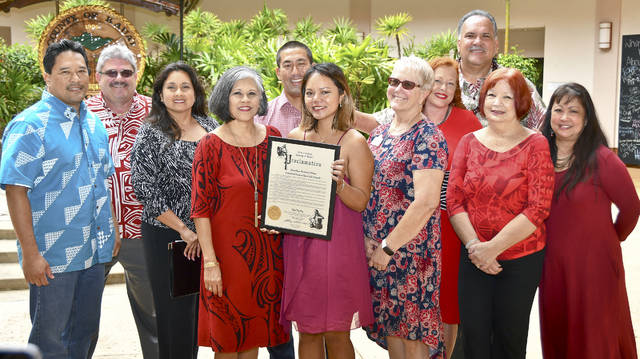

LIHUE — In Hawaii, women earn about 80 cents to every dollar a man earns. For indigenous Hawaiian and immigrant women, that percentage drops even more.
“Native Hawaiian women’s cents-on-the-dollar comparison to white men, fell from 64 cents in 2017, to 63 cents in 2018,” said Khara Jabola-Carolus, executive director for the Hawaii State Commission on the Status of Women, in a statement to TGI.
That’s why about 20 people gathered Tuesday at the Mo’ikeha Rotunda in the Lihue Civic Center to raise awareness for the nationwide issue of unequal pay for women.
April 10 was selected for Equal Pay Day because it symbolizes how far into the year women in the United States must continue to work, to earn what men earned in the previous year.
Last year, Equal Pay Day, she said, was one week earlier.
“Which means the pay gap has worsened,” she said.
Lihue resident Edie Ignacio Neumiller, vice chair of The Committee of the Status of Women and member of the Zonta Club of Kauai, who co-sponsored the rally along with the Zonta Club of Hanalei, told the crowd that women in every state experience the pay gap.
“Women face the pay gap in every occupation,” she said. “More education helps increase women’s earnings, but it still doesn’t close the gender gap.”
That gender gap, she said, is even worse for mothers and only grows with age.
Women, she said, are still paid less for equal work.
“Eliminating the wage gap is good for women and the economy,” she said. “I remember in the 70s when we tried to break the glass ceiling and let me tell you, we’re still trying to break the glass ceiling,” she said.
With movements like #metoo and #timesup and more women lawmakers taking office, Ignacio Neumiller said things are different.
“More women are starting to step up and getting into the Legislature, so maybe with more women getting into the Legislature and Congress, and state offices, more bills will get passed,” she said.
Currently in Hawaii, there are three bills before the Senate and the House that will help put an end to unequal pay. SB2351would prevent employers from inquiring about women’s past pay, and HB2598 and SB2990, which are family leave bills.
Kaulana Finn, representing Congresswoman Tulsi Gabbard, said wage discrimination in Hawaii is an issue.
“Wage discrimination effects women and hard working families here on Kauai and all across our islands and our country, who are trying to pay their bills, put food on the table and make ends meat,” she said
According the National Partnership for Women and Families, working women in Hawaii make just 84 cents for every dollar paid to men, creating a wage gap of more than $7,000 per year, she said.
Because of the pay gap issue, Gabbard has co-sponsored legislation such as the Paycheck Fairness Act, which will help level the playing field by increasing protections for employees and strengthening abilities to challenge pay discrimination under the law.
In his proclamation, Mayor Bernard Carvalho Jr., said though it’s been 50 years since the passage of the Equal Pay Act, women, especially minority women, continue to suffer the consequences of unequal pay.
“Fair pay equity policies can be implemented simply and without undo cost and hardship in both the public and private sector. Fair pay strengthens the security of families today,” he said.
•••
Bethany Freudenthal, Courts, Crime and County reporter, 652-7891 bfreudenthal@thegardenisland.com
more recommended stories
 Over 300 People Facing Federal Charges For Crimes Committed During Nationwide Demonstrations
Over 300 People Facing Federal Charges For Crimes Committed During Nationwide DemonstrationsThe Department of Justice announced that.
 Democrats’ Efforts To Destroy The Second Amendment Will Be Fought
Democrats’ Efforts To Destroy The Second Amendment Will Be FoughtWASHINGTON – U.S. Senator Lindsey Graham (R-South.
 Biden-Nominated Attorney Rachael Rollins Violated Ethics Laws
Biden-Nominated Attorney Rachael Rollins Violated Ethics LawsWASHINGTON—House Committee on Oversight and Accountability.
 US ‘Accidentally’ Sends $6.2 Billion to Ukraine
US ‘Accidentally’ Sends $6.2 Billion to UkraineJune 20 (Reuters) – The Pentagon.
 4 Very Young Children Critically Wounded in Knife Attack in French Alpine Town
4 Very Young Children Critically Wounded in Knife Attack in French Alpine TownPARIS (AP) — The prosecutor leading.
 Senator Atkins Introduces Bill to Strengthen Protections for Abortion, Gender-Affirming Care Providers in California
Senator Atkins Introduces Bill to Strengthen Protections for Abortion, Gender-Affirming Care Providers in CaliforniaMarch 21, 2023 SACRAMENTO – Senate President.
